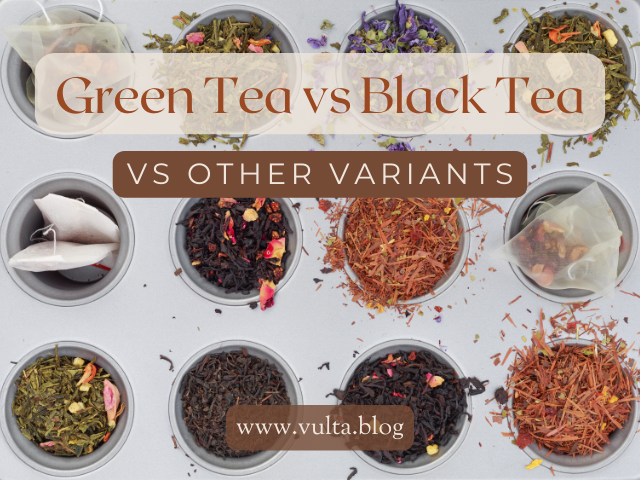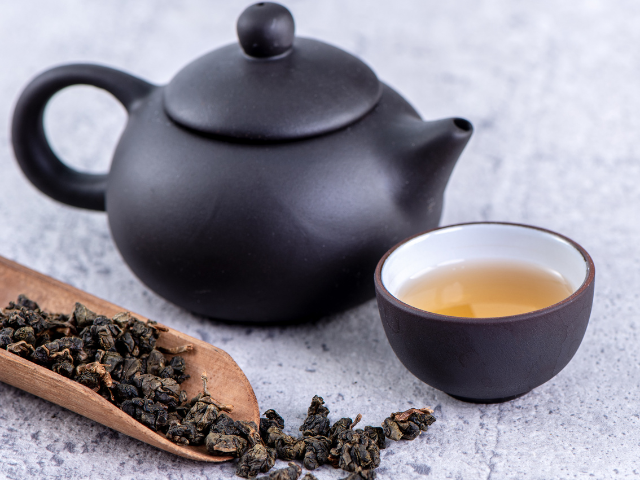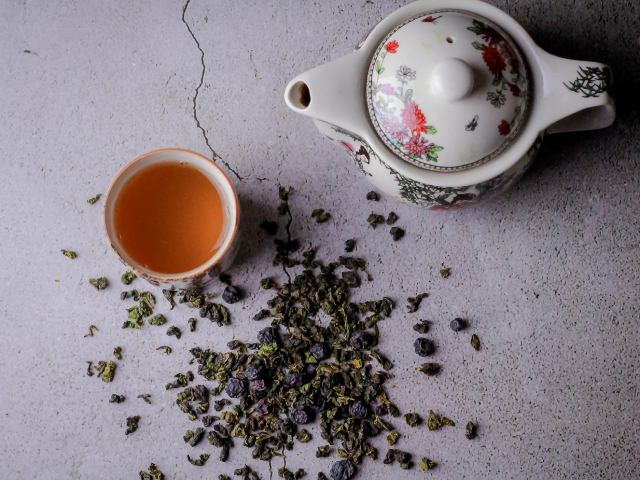Green Tea vs Black Tea vs other varieties: Is it healthy? Alternatives? Best one? & More

Is Green Tea Healthy?
Yes, it offers several potential health benefits which you can find by reading further below.
How about Black Tea and its other varieties?
Yes, just like Green Tea, black tea and its other varieties offers several potential health benefits, the only difference is their composition, which results in different kinds of health benefits for each tea, but few or several may be overlapping.
Green Tea vs Black Tea

Green tea and black tea are two popular types of tea that differ in their processing methods, flavor profiles, and some nutritional aspects.
Here are the key differences between green tea and black tea:
Caffeine Content
Green tea generally contains less caffeine than black tea, making it a popular choice for those looking to moderate their caffeine intake or seeking a milder stimulant effect, vice versa.
Taste
Green Tea:
- Lighter, grassy, and sometimes slightly astringent.
- Varieties can have floral, vegetal, or nutty notes.
Black Tea:
- Bold, robust, and can be malty, fruity, or spicy.
- Often served with milk and/or sugar, especially in Western cultures.
Antioxidant Content
Green Tea:
- Green tea is rich in antioxidants, particularly catechins such as epigallocatechin gallate (EGCG).
Black Tea:
- While black tea also contains antioxidants, the levels of catechins are generally lower due to the oxidation process.
- Black tea contains other types of antioxidants, such as theaflavins and thearubigins.
FURTHER DETAILS
What are the Health Benefits of Green Tea?
Rich in Antioxidant Properties
Green tea is rich in antioxidants, particularly catechins such as epigallocatechin gallate (EGCG).
These antioxidants help neutralize free radicals in the body, which can reduce oxidative stress and may lower the risk of chronic diseases.
Click for more details
"EGCG possesses a wide variety of anti-inflammatory, antioxidant, antifibrotic, anti-remodelation, and tissue-protective properties"
Source: https://www.ncbi.nlm.nih.gov/pmc/articles/PMC9820274/
Weight Management
Green tea has been studied for its potential role in weight loss and weight management.
Some research suggests that the catechins in green tea can enhance fat burning and boost metabolic rate.
Click for more details
"the ingredients of green tea are known not only to have anti-obesity effects on blood indicators and lipid profiles, but also to have a beneficial effect on abdominal obesity, a component of metabolic syndrome."
Source: https://www.ncbi.nlm.nih.gov/pmc/articles/PMC8910422/
Cancer Preventing Properties
The polyphenols in green tea may help inhibit the growth of cancer cells.
While more research is needed, some studies suggest that the antioxidants in green tea may have a protective effect against certain types of cancer.
Click for more details
"Green tea catechins are strong bioactive substances with anticancer properties. By altering crucial cellular processes such as cellular proliferation, differentiation, apoptosis, angiogenesis, and metastasis, they prevent the onset, growth, and progression of cancer."
Source: https://www.ncbi.nlm.nih.gov/pmc/articles/PMC9501439/
May reduce the chance of contracting Type 2 Diabetes
Green tea may have a positive impact on insulin sensitivity and glucose metabolism, potentially reducing the risk of developing type 2 diabetes.
Click for more details
"To conclude, green tea, with its major bioactive component EGCG, shows promise for health benefits in the treatment of benign gynecologic disorders."
Source: https://www.ncbi.nlm.nih.gov/pmc/articles/PMC10054707/
"Green tea and catechins were reported to improve glucose metabolism and reduce the risk of T2DM"
Source: https://www.ncbi.nlm.nih.gov/pmc/articles/PMC10104920/
Possesses Anti-Inflammatory Effects
Green tea has anti-inflammatory properties that may be beneficial in reducing inflammation in the body, which is associated with various chronic diseases.
Improves Liver Health
Some studies suggest that green tea may help protect the liver and improve its function. This could be beneficial for individuals with liver conditions.
Improves Heart Health
Regular consumption may be associated with a lower risk of heart disease.
Some studies suggest that green tea may contribute to cardiovascular health by improving blood vessel function, reducing cholesterol levels, and lowering blood pressure.
Better Cognitive Function
The caffeine and amino acid L-theanine in green tea may contribute to improved alertness, focus, and cognitive function.
What is L-theanine?
L-theanine is an amino acid that is naturally found in tea leaves. It is known for its potential calming and relaxing effects, and it is often cited as a contributor to the "calm alertness" associated with tea consumption.
Click for more details
"Epidemiological and animal studies have suggested that daily intake of green tea catechins suppresses age-related cognitive decline. EGCG, the main catechin in green tea, has been suggested to activate nerve cells, and its metabolic decomposition products act similarly, with a time lag."
Source: https://www.ncbi.nlm.nih.gov/pmc/articles/PMC8401650/
What are the Health Benefits of Black Tea
Antioxidant Properties
Similar to green tea, black tea has its own antioxidant properties, which some of the antioxidant properties of black tea overlap with those of green tea.
Black tea contains polyphenols, which act as antioxidants. These compounds may help neutralize free radicals in the body, protecting cells from oxidative stress and inflammation.
Heart Health Improvement
The same with green tea, black tea also help improve cardiovascular health with the help of antioxidants like flavonoids.
Regular consumption has been linked to a reduced risk of heart disease by improving cholesterol levels and blood vessel function.
Weight Control
While the mechanisms may differ slightly, black tea shares some similarities with green tea in terms of potential benefits for weight management.
Click for more details
"Black tea polyphenols have excellent anti-obesity activity without apparent side effects."...
"Black tea polyphenols inhibit the emulsion of droplets and the activity of pancreatic lipase, α-amylase and glucosidases. Furthermore, black tea polyphenols may also decrease food intake to reduce energy intake. Black tea polyphenols attenuate lipogenesis and enhance lipolysis."
Source: https://www.ncbi.nlm.nih.gov/pmc/articles/PMC6273558/
Better Cognitive Function
Just like with green tea, the caffeine content in black tea, along with other compounds like L-theanine, they may improve mood, cognitive performance, and attention.
Good Digestive Health
Black tea has been traditionally used to aid digestion. Compounds in black tea may have a beneficial impact on gut bacteria, promoting a healthy digestive system.
Lowering Blood Pressure
Some research suggests that the consumption of black tea may contribute to lower blood pressure, potentially reducing the risk of hypertension.
Click for more details
"We observed for the first time that black tea, naturally rich in flavonoids, counteracted or completely prevented the abnormalities in peripheral arterial haemodynamics that were caused by an acute oral fat load in never-treated hypertensive patients."
Source: https://www.ncbi.nlm.nih.gov/pmc/articles/PMC4344573/
"Tea consumption was associated with lower SBP and a reduced risk of hypertensive BP. The antihypertensive effect varies across types of tea consumed."
Source: https://www.ncbi.nlm.nih.gov/pmc/articles/PMC10010002/
Improved Immune Function
The antioxidants in black tea may support the immune system by protecting cells from damage.
Oral Health
Compounds in black tea may have antimicrobial properties that can help inhibit the growth of bacteria in the mouth.
This may contribute to improved oral health and reduced risk of cavities and gum disease.
What are the Health Benefits of other varieties of Tea?
Besides green tea and black tea, there are several other varieties of tea, each with its unique characteristics and potential health benefits.
The following are the other various types of tea along with their associated health benefits:
White Tea

- Antioxidant Rich: White tea, like green tea, is minimally processed and contains a high concentration of antioxidants, including catechins.
- Potential Cancer Prevention: White tea contains anti-cancer properties due to its high antioxidant content.
- Cardiovascular Health: White tea may contribute to heart health by improving cholesterol levels and reducing the risk of arterial plaque formation.
Oolong Tea

- Metabolism Boost: Oolong tea is partially oxidized, falling between green and black tea. Some studies suggest that it may enhance metabolism and contribute to weight management.
- Heart Health: Oolong tea lowers blood pressure and reducing cholesterol levels.
- Dental Health: Compounds in oolong tea may help prevent the growth of bacteria in the mouth, contributing to improved oral health.
Pu-erh Tea

- Digestive Health: Pu-erh tea is fermented and aged, and it is believed to have properties that support digestion and gut health.
- Cholesterol Regulation: Pu-erh tea helps lower bad cholesterol levels in the body.
- Weight Management: Pu-erh tea is sometimes associated with weight loss benefits, although more research is needed to confirm these effects.
Rooibos Tea

- Rich in Antioxidants: Rooibos tea is rich in antioxidants, including unique compounds like aspalathin and nothofagin.
- Anti-Inflammatory Properties: Rooibos tea has anti-inflammatory effects, potentially benefiting conditions related to inflammation.
- Heart Health: Rooibos tea reduces blood pressure and improving cholesterol levels.
Jasmine Tea

- Contains Antioxidant: Jasmine tea is rich in antioxidants like catechins, which helps combat free radicals in the body, potentially reducing oxidative stress and supporting overall health.
- Heart Health: Regular consumption of jasmine tea, particularly when based on green tea, has been associated with improved cholesterol levels and a reduced risk of cardiovascular diseases.
- Stress Reduction: The relaxing effects of L-theanine found in green tea contributes to stress reduction and a sense of calmness.
Something to know about Jasmine Tea
Jasmine tea is a type of scented tea that is typically made by blending traditional tea leaves with jasmine flowers.
It is essentially any tea—commonly green, white, or oolong—that is infused or scented with jasmine flowers.
KEY TAKEAWAYS
- All varieties of tea have differing and overlapping health benefits. There is no “best” one. It all comes down to personal tase preferences and the specific health goals of the individual.
- Incorporating a variety of teas into your diet can provide a range of flavors and potential health benefits.
Copyright ©2023 by Marshall Vulta




Comments ()